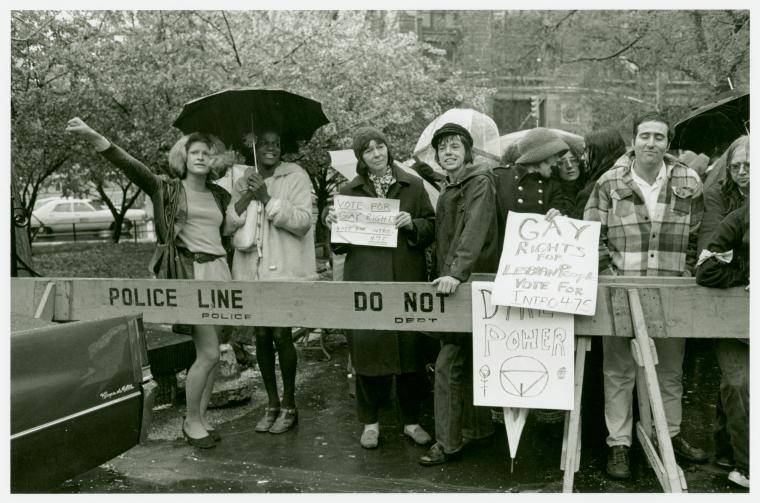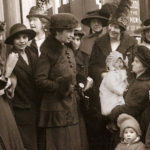For Pride Month, I looked into the history of the Stonewall Riots. An important part of that history is relevant this month. The Stonewall Inn was significant because it catered to the outcast amongst the outliers. They not only provided a safe space for underage homeless gay kids but a place for the transgendered, cross-dressers, and the gender fluid. Gay, lesbian and trans patrons socialized together. It was a place where they could find others like themselves, a place where they could feel safe even if it was only between police raids.
Long before the riots, activist groups were already forming and worked under the radar for equal rights. Constant raids, harassment, and abuse leading up to Stonewall made it an exploding pressure cooker. There are many conflicting accounts of who “started” the riots. What’s more significant are the amazing people who stood up for their rights that night. One of the notable people present that night was Marsha P Johnson, a trans person of color.
Marsha P Johnson was born Malcolm Michaels Jr. on August 24, 1945, in Elizabeth New Jersey. Malcolm moved to NYC in 1966, and legally changed her name to Marsha P Johnson. The “P” she said, stands for “Pay It No Mind,” a preemptive answer to a question she knew was on people’s minds. Marsha identified as a drag queen, though sometimes she would slip into a male persona and become Malcolm on occasion. When that happened, she could be mean and vicious. A majority of the time, she was kind and gentle.
She spent much of her first years in Greenwich Village on the street, a fate for most trans folk and drag queens. Wearing women’s clothes or looking effeminate in a way was unacceptable so kids were often thrown out of the house or they ran away. Marsha decided to escape her family that would not allow her to leave the house dressed as women by moving to the Village. To make ends meet, Marsha found sex work a reliable, if dangerous, way to make a living. She lived for many years couch surfing, staying overnight with Johns or even sleeping in a movie theater during the matinees. She would later find a permanent home with friends.
Marsha’s exuberant nature coupled with her love for extravagant accessories on a non-existent budget was well known and loved. She could often be found with massive amounts of flowers in her hair or with an elaborate hat. She would piece outfits together between dumpster diving, second-hand clothes, and castaways from the flower market. Marsha’s penchant for dramatic clothing served her well while she was a member of the Hot Peaches, a renowned gay theater troupe that ran from 1972 to 1998. In the same spirit as San Francisco’s Cockettes, Hot Peaches was well known for its entertaining and thought-provoking performances. Marsha would read poetry or sing, to much acclaim.
While Marsha was already a member of the Gay Liberation Front, she formed the Street Transvestite Action Revolutionaries, STAR, with her friend Sylvia Rivera in 1970. STAR helped young drag queens and trans women with food and shelter. Their goal was to help cast out young street queens, but they were open to anyone who needed their help. They looked after any street kids trying to survive around the Christopher Street docks. Housing was a challenge. At first, Marsha and Sylvia put up as many as they could in their hotel rooms. They then tried using an abandoned tracker trailer until the owner recovered it with the street kids still inside. Eventually, they renovated a burned out house owned by the mafia that became known as STAR House. Marsha was “mother” to the kids at STAR House during the two years it lasted before they were forced to leave. She and Sylvia hustled on the streets to make money to provide for them so they could stay off the streets. They ran STAR as a collective with everyone helping to provide food and supplies as best they could.
Marsha and Sylvia continued to advocate and help street queens and queer youth even after their attempts to provide a permanent place for them was foiled. They were often seen at marches and protests together. Marsha was also involved with ACT UP (AIDS Coalition To Unleash Power), an AIDS advocacy group that formed in 1987.
In 1974, Marsha was photographed and painted by Andy Warhol. Warhol decided to do a series based on drag queens. He went to the Gilded Grape, a nightclub popular with cross-dressers, and took photos of several drag queens hanging out at the nightclub. These large format polaroids were transferred to paintings as a silk screen. Marsha’s photo, a brightly smiling portrait with a playful pigtailed wig, became part of his “Ladies and Gentlemen” series first shown in Italy.
As she became a beacon of light for street queens, an inspiring performer and a work of art, Marsha also struggled with mental illness. She even claimed to have visions. Despite not being accepted by the Catholic Church, she was very spiritual and was known to pray prostrate at the foot of a statue of Mary at the local churches. Living as gender non-conforming drag queen and a person of color was already a challenge. Coupled with the dangers of sex work this added immense pressure and stress in her life. During her lifetime, she experienced several attempts on her life by Johns, so many arrests she lost count, and many nervous breakdowns. Despite all this, Marsha was always known to give what little food and money she had to others. There’s a story that she used the last of her money to buy a back of cookies then wound up giving away most of it to the street queens she passed. Marsha’s would rather give away the last of what she had rather than see others go in need.
Marsha’s live was cut short in July of 1992. A few hours after the Pride March on July 6th, her body was found floating in the Hudson River near the Christopher Street piers. The police dismissed it as a suicide, but everyone who knew her argued that was impossible. There had been no indication she was suicidal. What they did know was that she was harassed shortly before she was found dead. Friends rallied to have her death investigated, but the case was closed. In 2012, Mariah Lopez lobbied to reopen the case and won. The New York police department reopened the case as a possible homicide2012. Unfortunately, I can find lots of info about the reopening of the case but nothing about any results. As far as I can tell, the case is still open and unsolved.
Marsha was a champion of trans rights and a guardian angel for the cast off runaways she found in the West Village. There are amazing stories of her vibrant personality and her endless generosity. While not without her demons, she made a big different in the lives of many and continues to be an inspiration long after her death.
Last modified: November 15, 2016




